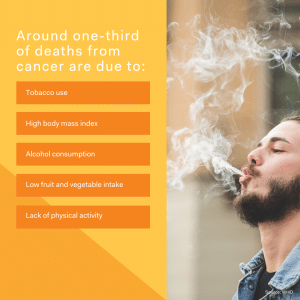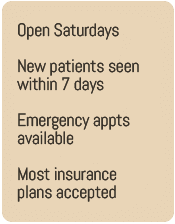Cancer Prevention Tips and Guidelines
In 2024, it is estimated that as many as 2 million people will be diagnosed with cancer in the U.S., an increase from past years. It is predicted that more than 600,000 people will die from cancer by the end of the year, consistent with cancer deaths in 2022.
While these cancer statistics may seem grim, the big picture shows that preventative efforts have decreased the mortality risk of cancer over the past few decades. Between 1991 and 2021, the risk of dying from cancer decreased by 33 percent, in part due to new research, treatments and active prevention efforts.
When it comes to cancer, not everything can be controlled, but there are lifestyle changes you can follow to reduce your cancer risk. The team at Personalized Hematology-Oncology is here to provide prevention tips to help reduce your risk of developing cancer.
Way to prevent cancer
While some factors like age and genetics play a role in developing cancer, there are multiple lifestyle habits that are linked to cancer cases.
According to the American Association for Cancer Research, “tobacco use, unhealthy diet, physical inactivity, UV exposure, alcohol consumption, pathogenic infections, and obesity contribute to the development of 40 percent of all cancers.”

Photo courtesy of Union for International Cancer Control
To improve your chances of staying healthy throughout your lifetime and mitigating your cancer risks, consider the following lifestyle changes:
- Increased physical activity: Because physical inactivity is connected to developing specific types of cancer, exercising up to 40 minutes daily can help lower that risk. Exercising frequently has other health benefits, including stress management and increasing bone strength.
- Reduce alcohol intake: A great deal of socialization revolves around alcohol, whether you are meeting friends for a night out or enjoying a glass of wine at home. But be aware that drinking alcohol increases the risk of cancer. The World Health Organization estimates that alcohol intake can be attributed to hundreds of thousands of new cancer cases.
- Eat a healthy diet: By limiting processed foods, sugars, and red meat while increasing vegetable, lean protein, and whole grain intake, you can help decrease your risk of developing cancer. Of course, there is no one-size-fits-all diet, and it is important to consult a nutritionist to ensure you get balanced nutrients.
The most common types of cancer
With four different stages of cancer, no two cancer cases are the same. On top of the four stages of severity, there are many types of cancer that affect various body systems and respond to treatment in different ways.
The 12 most common types of cancer are breast cancer, prostate cancer, lung cancer, colorectal cancer, melanoma, bladder cancer, non-Hodgkin lymphoma, kidney cancer, uterine cancer, leukemia, pancreatic cancer and thyroid cancer. Learn more about the cancer types.
According to the National Institutes of Health, “Breast, lung and bronchus, prostate and colorectal cancers account for almost 50 percent of all new cancer cases in the United States. Lung and bronchus, colorectal, pancreatic and breast cancers are responsible for nearly 50 percent of all deaths in the United States.”
The importance of cancer screenings
One of the most proactive ways you can stay cancer-free is to get regular cancer screenings. If the best offense is a good defense, you should consider these screenings your best defensive measure. They help you stay aware of your body’s condition and, should cancer or a pre-cancerous area be detected, early detection can be the key to preventing serious problems later on.
You can have screenings for some of the most common cancer types. Your physician may even suggest certain screenings based on your health history or age.
Colonoscopy: This procedure examines your large intestine, known as your colon, and parts of your small intestine. Colonoscopies are frequently used to diagnose inflammatory bowel diseases like Crohn’s disease and can also be used as a screening tool for colorectal cancers.
Mammogram: Mammograms are a type of x-ray used to diagnose early stages of breast cancer. Because treatment is often successful when breast cancer is diagnosed early, mammograms are typically recommended once women reach a certain age or are considered higher risk.
Skin exam: To detect melanoma, a skin exam from a dermatologist can be a good first step. Those who have risk factors for skin cancers like melanoma should get a yearly exam. If a dermatologist suspects melanoma, a biopsy can be taken.
Pancreatic cyst scans: Pancreatic cancer typically does not cause symptoms in early stages, making early detection difficult. To keep pancreatic cancer from developing, pancreatic cyst scans can help doctors find and treat cysts that increase the risk of cancer. These scans are typically done through an MRI or CT scan.
Lifestyle changes for lung cancer and skin cancer
Just as limiting alcohol intake can help you stay healthy and prevent cancer, avoiding tobacco and nicotine can greatly reduce the risk of developing lung cancer. With the rise of e-cigarettes, it is more important than ever to understand the dangers of nicotine and tobacco use.
According to the National Library of Medicine, smokers are at greater risk of dying from lung cancer. The risk is more than 23 times higher in men and about 13 times higher in women than for nonsmokers. This makes not smoking or quitting smoking one of the best ways to prevent lung cancer.
In addition to getting a yearly skin exam, there is a simple way to prevent skin cancer. Using a high broad-spectrum sunscreen every day blocks harmful UVA and
UVB rays. This, combined with staying in the shade when possible, can help limit damaging sun exposure and reduce the risk of developing skin cancer.
Cancer prevention in North Carolina
A healthy lifestyle is a reward on its own, but its long-term benefits for cancer prevention will be a worthy investment.
If you would like to get a checkup or speak with a doctor about your genetic cancer risk or how lifestyle changes can reduce your risk, Personalized Hematology-Oncology offers primary care services to help you feel your best. Contact us today to make an appointment and learn more about cancer prevention methods.





